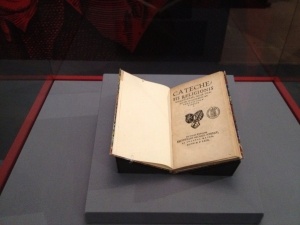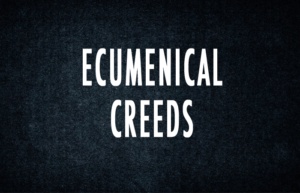The Apostles’ Creed (which was not actually written by the Apostles) began to develop as part of the catechesis (basic Christian instruction) in the Roman church late in the 2nd century (c. 150-80). One of the clauses of the creed that has . . . Continue reading →
apostles’ creed
What Must A Christian Believe?
The questions often arise, “what must a Christian believe to be saved”? or “what are the essentials?” Most often the broad evangelical answer is “not much.” The tendency is toward minimalism in doctrine (belief) and practice. In some circles it is enough . . . Continue reading →
The Source of A Variation Of The Apostles’ Creed In Question 23
Most Lord’s Days, in the evening (second) service, the congregation recites the Apostles’ Creed. This is an ancient, biblical practice. The church has been reciting creedal formulae since the Israelites first said the Shema (Deut 6:4): “Hear O Israel, Yahweh Our God, . . . Continue reading →
The Christian Faith Is Trinitarian
When most people think of the Reformed confession of the Christian faith they probably think about predestination. This is the minimalist definition that is often used. When evangelicals say, “I’m Reformed” what they often mean is, “I’ve adopted the doctrine of election” . . . Continue reading →
Heidelberg 44: Why Did Jesus Suffer The Torment Of Hell?
Creeds and confessions are unavoidable. As many have noted even the slogan “no creed but Christ” is a short, inadequate confession. Let someone enter a congregation where that confession reigns and say, “We should say more about the faith” and what will . . . Continue reading →
Apostles’ Creed
1. I believe in God the Father Almighty, Maker of heaven and earth. 2. And in Jesus Christ his only begotten Son, our Lord. 3. Who was conceived by the Holy Spirit, born of the Virgin Mary. 4. Suffered under Ponce Pilate, . . . Continue reading →
Heidelberg 53: We Believe In The Holy Spirit (2)
53. What do you believe concerning the Holy Spirit ? First, that He is co-eternal God with the Father and the Son. Secondly, that He is also given to me, by true faith makes me a partaker of Christ and all His . . . Continue reading →
Heidelberg 56: In The Church: The Forgiveness Of Sins
There are few things more difficult than forgiving when one has been wronged. First, when a wrong has been done, quite apart from its effect for us (and its affect in us), justice itself has been violated. Second, to be wronged is . . . Continue reading →
Perkins On Churches And Sects
As for the assemblies of Anabaptists, Libertines, Antinomies, Tritheists, Arians, Samosatenians, they are no Churches of God, but conspiracies of monstrous heretics judicially condemned in the primitive Church, and again by the malice of Satan renewed and revived in this age. The . . . Continue reading →
The Holy Catholic Church Or A Holy Catholic Church?
Recently I received a query about which English translation of the 9th article of the Apostles’ Creed is correct: “a holy catholic church” or the holy catholic church”? As far as I can tell the evidence is overwhelmingly on the side of . . . Continue reading →
Augustine: The Rule Of Faith Is The Apostles’ Creed
1. Receive, my children, the Rule of Faith, which is called the Symbol (or Creed). And when ye have received it, write it in your heart, and be daily saying it to yourselves; before ye sleep, before ye go forth, arm you . . . Continue reading →
Christ’s Death And Ours (Isa 52:13–53:12; Heidelberg 40–44)
40. Why was it necessary for Christ to suffer “death”? Continue reading →
New Resource Page: The Ecumenical Creeds
The word ecumenical means universal and the ecumenical creeds are the church’s articulation of the universal (or, in that same sense) catholic faith taught in Holy Scripture and confessed by the church since the time of the apostles. The apostolic church itself . . . Continue reading →
Heidelcast 183: What Must A Christian Believe? (1)—Our Ancient, Universal, Christian Faith
This is episode 1 in the series, “What Must A Christian Believe?” I chose this title for two reasons: 1) Since I began pastoral ministry in 1987 it is one of the questions I have received most often; 2) it is Question . . . Continue reading →
Heidelcast 184: What Must A Christian Believe? (2)—“Credo”
This is episode 2 in the series, What Must A Christian Believe? If you are just joining the series, you can find all the episodes in the show notes for this episode in the show notes below. Last time we considered the . . . Continue reading →
Heidelcast 186: What Must A Christian Believe? (4)—A Summary Of The Creed
The question for this series comes from Heidelberg Catechism 22. The answer is that a Christian must believe “all that is promised us in the gospel, which the articles of our catholic, undoubted Christian faith teach us in sum.” We’ve traced the . . . Continue reading →
Heidelcast 188: What Must A Christian Believe? (6): God The Father Almighty
We start this episode by thinking a bit about an audio clip in the intro. If you are one of those who skips the intro 😮 please go back and listen for context. See also the show notes below for more. I . . . Continue reading →
Heidelcast 189: What Must A Christian Believe? (7): Against Deism, Gambling, Pentecostalism, And Biblicism
Lots of evangelical Christians take it for granted that God and humans are co-equals. I know because I once thought that way. That is a profoundly Modern and Modernist way of thinking. It is not a biblical way of thinking nor is . . . Continue reading →
Heidelcast 190: What Must A Christian Believe? (8): “And I Believe In Jesus Christ, His Only Begotten Son, Our Lord”
This is episode 8 in the series, What Must A Christian Believe? In this episode we are considering the third article of the Apostles’ Creed: “And I believe in Jesus Christ, his only begotten Son, our Lord, our Lord.” With this article . . . Continue reading →
Heidelcast 192: What Must A Christian Believe? (10): “Conceived By The Holy Spirit, Born Of The Virgin Mary”
This is episode 10 in the series, What Must A Christian Believe? In this episode we are considering the third article of the Apostles’ Creed. The late and apostate Episcopal Bishop, which apparently did not disqualify him from holding episcopal office in . . . Continue reading →










